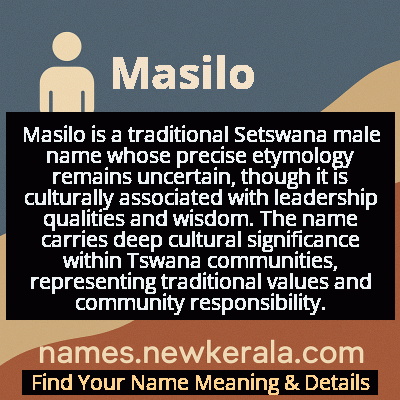Masilo Name Meaning & Details
Origin, Popularity, Numerology Analysis & Name Meaning of Masilo
Discover the origin, meaning, and cultural significance of the name MASILO. Delve into its historical roots and explore the lasting impact it has had on communities and traditions.
Name
Masilo
Gender
Male
Origin
African
Lucky Number
6
Meaning of the Name - Masilo
Masilo is a traditional Setswana male name whose precise etymology remains uncertain, though it is culturally associated with leadership qualities and wisdom. The name carries deep cultural significance within Tswana communities, representing traditional values and community responsibility.
Masilo - Complete Numerology Analysis
Your Numerology Number
Based on Pythagorean Numerology System
Ruling Planet
Venus
Positive Nature
Harmonious, responsible, caring, and artistic.
Negative Traits
Overly idealistic, superficial, possessive, or jealous.
Lucky Colours
Pink, turquoise.
Lucky Days
Friday.
Lucky Stones
Diamond, turquoise.
Harmony Numbers
2, 3, 9.
Best Suited Professions
Artists, musicians, teachers, healthcare workers.
What People Like About You
Warmth, nurturing nature, artistic flair.
Famous People Named Masilo
Masilo Mokone
Religious Leader
Founder of the Ethiopian Church in Southern Africa and early African independent church movement leader
Masilo Makhura
Academic Historian
Renowned scholar of Southern African history and author of several influential works on Botswana's development
Masilo Selemela
Football Player
Professional footballer who played for Botswana national team and various club teams in Southern Africa
Masilo M. Makhura
Cultural Preservationist
Leading advocate for Setswana language preservation and traditional cultural practices
Name Variations & International Equivalents
Click on blue names to explore their detailed meanings. Gray names with will be available soon.
Cultural & Historical Significance
In traditional Tswana society, names are not merely labels but are believed to influence the bearer's destiny and character, making the selection of a name like Masilo a significant cultural decision that reflects family values and community expectations. The name embodies the cultural emphasis on wisdom, leadership, and social responsibility that are highly valued in Tswana communities. It serves as a reminder of the importance of maintaining cultural traditions while adapting to contemporary life, representing the resilience and continuity of Setswana cultural identity through generations.
Extended Personality Analysis
Individuals named Masilo are typically associated with strong leadership qualities, wisdom, and a deep sense of responsibility toward their community. They are often perceived as natural leaders who possess the ability to guide others with fairness and insight. The name carries connotations of reliability and trustworthiness, with bearers expected to demonstrate integrity and moral strength in their actions. These individuals are often seen as pillars of their communities, offering counsel and support while upholding traditional values.
Masilo is also linked to qualities of perseverance and resilience, reflecting the cultural value placed on enduring through challenges while maintaining one's principles. The name suggests someone who balances traditional wisdom with practical decision-making, making them respected figures in both family and broader social contexts. Bearers of this name are often characterized by their calm demeanor, thoughtful approach to problems, and ability to mediate conflicts. They tend to be deeply connected to their cultural roots while being forward-thinking, embodying the ideal of maintaining tradition while embracing progress.
Modern Usage & Popularity
In contemporary times, Masilo remains a respected and moderately popular name within Setswana-speaking communities, though its usage has evolved with modern naming trends. While traditional names faced competition from Western names during the colonial and post-colonial periods, there has been a cultural resurgence in recent decades with many parents returning to indigenous names to preserve cultural heritage. Masilo is particularly favored by families seeking to maintain strong connections to Tswana traditions while embracing modern identity. The name appears across various social strata in Botswana and among Tswana diaspora communities, maintaining its cultural authenticity while adapting to contemporary naming practices. Its usage reflects a balance between honoring ancestral traditions and participating in modern African identity formation, with the name continuing to be chosen by parents who value cultural preservation and want to instill a sense of heritage in their children.
Symbolic & Spiritual Meanings
Symbolically, Masilo represents the enduring strength of cultural traditions and the importance of community leadership. The name embodies concepts of wisdom passed through generations, serving as a living connection to ancestral knowledge and cultural continuity. It symbolizes the bridge between traditional values and contemporary life, representing the ability to maintain cultural identity while navigating modern challenges. Masilo also carries metaphorical meanings of stability and foundation, suggesting someone who provides grounding and direction within their social circle. The name evokes images of deep roots and strong cultural foundations, symbolizing the preservation of heritage while allowing for growth and adaptation in changing times. It represents the ideal of balanced leadership that respects tradition while embracing necessary evolution.

